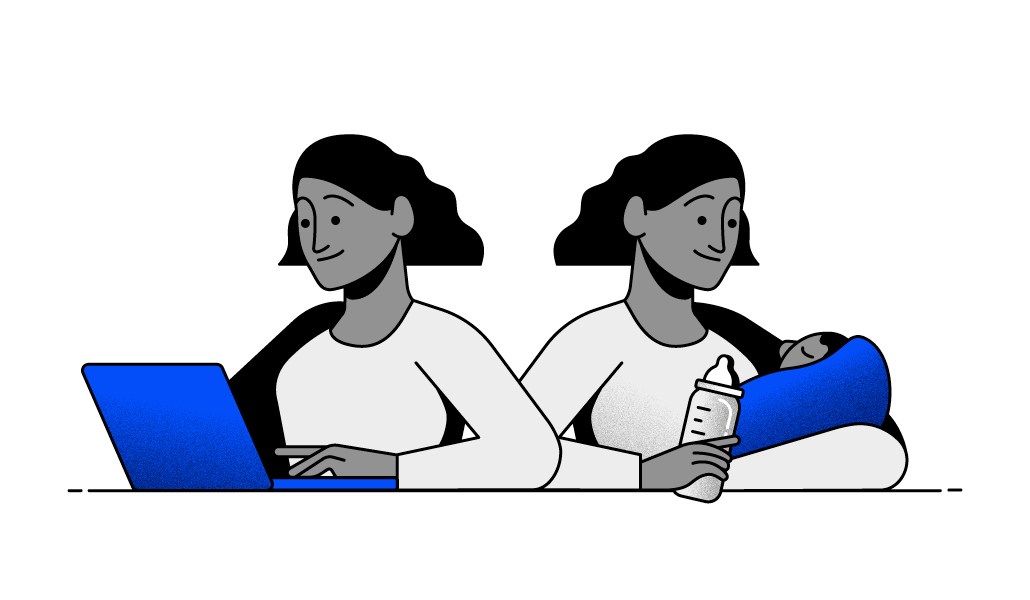How ‘working mom guilt’ – worsened by the pandemic – should be tackled

The coronavirus pandemic has worsened an existing chronic issue for female workers everywhere: working mom guilt.
It’s a term that refers to the ever-present anxiety most mothers have about balancing their jobs and their kids’ needs, without neglecting either one. That feeling only intensified during the pandemic as women found themselves home-schooling while juggling jobs, or as millions did — having to leave the workforce altogether.
“Working mom guilt is real, and it’s a sign that our support systems — from paid parental leave to supportive work cultures — need a reboot,” said Gina Nebesar, co-founder of Ovia Health, a digital platform offering family health support.
In July 2021, Reshma Saujani set up a national non-profit organization — Marshall Plan for Moms — dedicated to tackling some of the root causes of chronic, parent-anxiety related issues by working to transform workplaces, government policies and overall culture to value women’s labor.
“Marshall Plan for Moms is a movement to center moms in our economic recovery and fight for the policies moms need to thrive, like affordable child care, paid leave, and equal pay for moms,” said Saujani, who is also founder of well-known organization Girls Who Code.
The organization launched during the most trying time for parents during the pandemic — when schools and daycares were closed. “Moms were working around the clock trying to hold it all together,” said Saujani. “They were being pushed out of the labor force, giving up their paychecks, their dreams, sacrificing their mental health and the thing is no one even asked us. We didn’t have a choice. It was clear that the system was broken — and frankly that it had never worked for moms in the first place,” she added.
The group’s latest campaign, which took place in the run-up to Mother’s Day in the U.S. on Sunday May 8, highlighted that “mom guilt” also extends to non-work. “It’s about doing anything for ourselves, she said. “Living up to the ideal of a ‘perfect mom’ is not only a losing battle, but it’s hurting our mental health, “[b]ut when we actually build structural supports to help moms thrive at home and at work, we can start to make it easier.”
Edie, who preferred to give only her first name, is among those to have struggled with juggling work and family, even while she worked remotely.
“Often I would feel guilty for not being present with my daughter or hiding somewhere in the house to get work done while my husband would watch her,” she said.
Edie found support through the Marshall Plan for Moms. She gained confidence to speak up at work and advocate for better-paid family leave policies.
Saujani believes eradicating latent anxiety and guilt requires changes to both internal culture and policies. “We need to create a society where women have choices, where they can move in and out of the workforce over the course of their lives without penalty. Some of that is cultural — we have to start recognizing that caregiving has value, that it is worthy.”
The rest is about policy. “[W]hen we expect women to go back to work without adequate paid leave, without having time to recover or bond with their babies, or when we ‘mommy track’ them when they return to work, we are taking those choices away and creating enormous anxiety for women to shoulder,” she added.
A talent issue for employers
Research by Ovia Health, published in January, determined that more than 3.5 million mothers of school-age children have left their jobs since February 2020, many unable to afford or access reliable child care. The number is so large that women’s workforce participation has reportedly dropped to levels last seen in the 1980s.
To better understand their motivations and desires for family-friendly benefits, Ovia surveyed 2,919 parents. An overwhelming 90% said they would leave their employer for one with better benefits. When asked to rank what mattered most out of a list of more than 40 options, the top three choices were: better leave policies, a family-friendly culture, flexible schedules and remote or hybrid work options.
“[E]mployers who offer longer paid leave have higher retention rates and, more importantly, keep mom and baby as healthy as possible,” said Ovia’s Nebesar. She also referred to a 2020 report by the Better Life Lab that found 31% of fathers can’t be the dads they want to be, primarily because of a general lack of time.
Flexible work options, PTO, quality lactation rooms, child care assistance (like on-site childcare and financial support), mental health support, and equitable pay are urgent for all employers to adopt in order to rid working parents of unrealistic guilt, improve overall parental well-being, and improve inclusivity, stressed Nebesar. And while the more progressive companies have pushed to provide at least some of these, it’s far from being mainstream.
“Employees are actively seeking employers that don’t force them to choose between who they want to be in their career and the type of parent they want to be,” she said.
3 Questions with Yulia Barnakova, digital innovation lead for leadership advisory and executive search firm Heidrick & Struggles
Your role is focused on advising business leaders which emerging tech they should prepare for, what’s top of mind currently?
I’ve long been into VR and I think the metaverse is an absolute game changer for business leaders across industries. And it’s something that leaders of all industries need to get ready for. One of the things I always say is that the technology and the use cases are actually here, but the skills and the mindsets and the culture are lagging behind. And that’s what I’m here to do, bridge the gap and let people see where they should accelerate their skills, so they’re not left in the dust.
Most business leaders are still trying to figure out the right hybrid workforce model, how can the metaverse help them with challenges like that?
There are so many different ways of engaging in the hybrid workforce, everything from Zoom, Teams to Metaverse technologies. One of the things clients are saying is: ‘We want to recreate the human connection. We can’t really get those water cooler serendipitous conversations on Zoom and Teams. So how do we recreate that in the hybrid work world?’ And one use case of the metaverse — which we define as a platform in which people can move around freely as avatars and interact — is through social events, entertainment purposes or business collaboration. Metaverse platforms allow you to get those water cooler conversations back. They allow you to set up events, let’s say a virtual career fair, where employers can have a booth and people can mill around, run into people and have those side conversations.
Another use case that we’re seeing with clients is they’ll set up a conference or a large-scale meeting on one of these platforms. And there again, people walk around, they go to one room, they step out, they go to another room. And it’s literally like a conference where you can walk around and be in this space and talk to people.
You mentioned career fairs, is it going to be an important recruitment tool?
There’s a huge war for talent going on. It’s those leaders and companies who can demonstrate innovative ways of working and being on the platforms where that highly sought after talent is, who will get that leg up on the competition. Because if you have one company that is recruiting in the traditional way, and doing what they’ve always done, and you have another that is starting to invest in these virtual career fairs, where they go into the metaverse — platforms where the tech talent is that they’re seeking, or the younger talent is — you’re proving to that talent that, ‘hey, we can hang in these kinds of environments, and that we are forward-thinking and innovative, just like you.’ And that also cultivates a sense of inclusion and belonging, where people feel like, wow, this company kind of gets me. — Jessica Davies.
By the numbers
- 22,064 of unfair dismissal complaints made by U.S. employees in 2020 were race related, and 21,398 were gender related.
[Source of data: Lensa report.] - 30% of 2,000 U.S. workers polled say they’re more comfortable now discussing personal life matters in a professional setting, and 23% say it’s more acceptable to show emotion at work than before the pandemic.
[Source of data: LinkedIn data.] - 7 in 10 out of 1,205 Gen Zers polled, find it important to have in-person socialization with their colleagues.
[Source of data: TalentLMS report.]
What else we’ve covered
- Since news leaked Monday night to Politico that Roe v. Wade will likely be overturned by the Supreme Court, many employers are weighing how they plan to support employees who live in states where the practice could become illegal,
- ‘It’s going to turn the company culture toxic”: In the latest instalment of WorkLife’s Confessions series, we spoke with a range of employees and bosses across different industries to gauge their honest feelings about the return to the office.
- In the wake of the U.K. scandal in which politician Neil Parish resigned in disgrace after being caught viewing porn while at work, we take a look at when an employer has grounds for dismal or legal action.
- Many employers have adopted technology that tracks how staff are using office space. That data then inform decisions around future real estate investments, workspace configurations and what tech to use.
- Jennifer Trzepacz, chief human resources officer at SymphonyAI, explains that hybrid means more than going into the office one or two days a week.
- Social marketers have benefited from wellness measures put in place since the pandemic. It’s one way companies are acknowledging the toll the last two years have taken on their workforces.
- Employers are introducing ‘hangover’ and duvet days, to keep up staff morale and prevent fatigue. And some have implemented ‘disappointment’ PTO for those impacted by miscarriage or negative pregnancy tests.
- The past two years has changed pet owners’ attitudes towards their furry buddies when it comes to how they fit into their workday.
- Jordan and Wagner devote their recently published book Right Leader, Right Time to the four styles of leaders they’ve identified: fixer, artist, builder and strategist.

